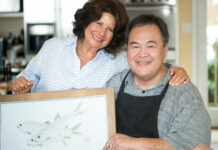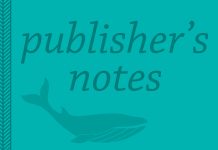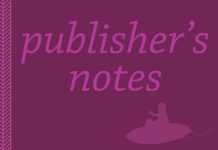By Diane Haynes Woodburn
 Hippity hop. . . . As this issue goes to press, it’s the Chinese New Year, and time to welcome in the Year of the Rabbit. “A placid year” the online zodiac page tells me, “very much welcomed and needed after the ferocious year of the Tiger.” Although I could take offense, being a Tiger myself, I admit that I am ready for the more pleasant period the Rabbit promises. It is reassuring indeed to anticipate a year in which “diplomacy, international relations and politics will be given a front seat again.”
Hippity hop. . . . As this issue goes to press, it’s the Chinese New Year, and time to welcome in the Year of the Rabbit. “A placid year” the online zodiac page tells me, “very much welcomed and needed after the ferocious year of the Tiger.” Although I could take offense, being a Tiger myself, I admit that I am ready for the more pleasant period the Rabbit promises. It is reassuring indeed to anticipate a year in which “diplomacy, international relations and politics will be given a front seat again.”
I am hopeful the Rabbit is true to his horoscope. As we close the year on the Tiger, the Middle East is in turmoil, with protests in Egypt brewing a dark storm. And yet I find myself, and so many others, watching these events with optimism and hope. We bear witness to what seems a shifting paradigm in the basic concepts of human rights and world consciousness.
In the short time it has taken us to put this issue together, the Middle East has undergone a remarkable and historical transformation. First in Tunisia and now in Egypt, people are changing the power structure, not by war and mayhem, but by raising their voices, their placards, and their hopes. The Middle East is moving toward freedom through the power of connection, thanks, in part, to modes of communication that have only come into use within the last few years.
Take, for example, a story I recently read online in The New York Times about a young Egyptian woman who defied the customs of her culture to speak face to face with her nation. Days before the government temporarily pulled the plug on the Internet, Asmaa Mahfouz posted a video of herself on Facebook, speaking straight into the camera: “As long as you say there is no hope, then there will be no hope, but if you go down and take a stance, then there will be hope.” The power of that single authentic voice encouraged and empowered thousands. Who could have imagined that a social concept like Facebook or Twitter would someday topple a tyrant?
I have no way of knowing what will have transpired in the Middle East by the time this column reaches you. But Asmaa’s words continue to give me heart—and resonate even here, as I look over the stories of this, our environmental issue. I take pride in the many individuals of our own community who are making a difference, large or small, by simply using the power of their convictions in action and words to shift the paradigm in our relationships with nature.
In particular, I am inspired by Shannon Wianecki’s story Pono, which explores a major and dynamic shift from the closed systems of western scientific thought, to the inclusive and nurturing systems of ancient Hawaiian teachings. The Islands’ first people have long told us that man is not above nature, but a part of it—part of the same family. Now scientists have begun to listen, to consider the Hawaiian paradigm not as superstition, but as fact—and as Shannon’s story illustrates, beginning to see the difference such a perspective makes in the success of conservation.
What better sign than the Rabbit to take leaps of understanding among peoples and ideas—and bring us along with him? Looking forward to the Year of the Rabbit, it is my hope that we welcome this new year with the willingness to consider possibilities. Let it be the year of hope, of change, and wisdom.
I never thought I’d be so glad to see a rabbit.




